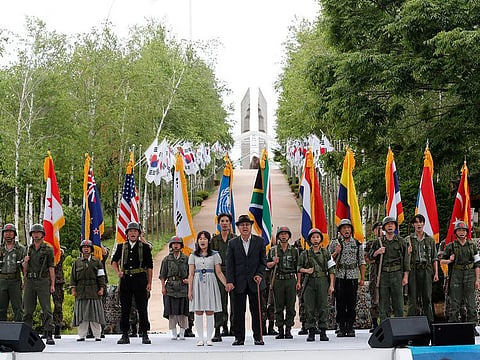North and South mark 70th anniversary of Korean War
North Korea invaded the US-backed South on June 25, 1950; the war ended in an armistice

Also In This Package
Seoul: North and South Korea on Thursday separately marked the 70th anniversary of the start of the Korean War, a conflict that killed millions of people and has technically yet to end.
Communist North Korea invaded the US-backed South on June 25, 1950, as it sought to reunify by force the peninsula Moscow and Washington had divided at the end of the Second World War.
The fighting ended with an armistice that was never replaced by a peace treaty, leaving the peninsula and millions of families split by the Demilitarized Zone.
In the South, the remains of nearly 150 soldiers repatriated from Hawaii after being excavated in the North were to be formally received at a government ceremony on Thursday evening, themed "Salute to the Heroes".
It was scheduled to include video messages from the leaders of the 22 foreign nations that made up the UN coalition defending the South, starting with President Donald Trump of the United States, which led the UN alliance.
Earlier, Seoul and Washington's defence ministers reaffirmed their commitment to defending "the hard-fought peace".
"On this day in 1950, the US-ROK military alliance was born of necessity and forged in blood," said US Secretary of Defence Mark Esper and his South Korean counterpart Jeong Kyeong-doo.
Up to three million Koreans died in the conflict, the vast majority of them civilians.
Nearly 37,000 Americans were among the more than 40,000 UN soldiers killed, and Western estimates say China, which backed the North, saw 400,000 fatalities, while Chinese sources put it at about 180,000.
The North has a different history of the period, which it knows as the Victorious Fatherland Liberation War, and insists that it was assaulted first, before it counter-attacked.
In Pyongyang, citizens and soldiers attended a war heroes' cemetery on the outskirts of Pyongyang to lay flowers before the graves and bow.
"Cede not an inch of ground!" read an inscription on a statue of a machine-gunner.
The official Rodong Sinmun newspaper carried more than 10 stories on the war, including an editorial asserting that a US invasion had turned "the entire country into ashes" but that it had forced the "aggressors" to sign a "surrender document".
"A ceasefire is not peace," it said. "The enemy is aiming for the moment that we forget about June 25 and lower our guard."
The nuclear-armed North, which is subject to multiple international sanctions over its banned weapons programmes, says it needs its arsenal to deter a US invasion.
Negotiations between Pyongyang and Washington have been deadlocked for months, leaving inter-Korean relations in a deep freeze despite a rapid rapprochement in 2018 that brought three summits between North Korean leader Kim Jong Un and the South's President Moon Jae-in.
White doves
At the site of one of the key battlefields in Cheorwon county near the Demilitarized Zone a handful of surviving South Korean war veterans marked the anniversary.
"It is our misfortune that the South and North had to live for nearly 70 years in confrontation because of the war," a veteran said, before releasing white doves as a symbol of their hopes for a final peace settlement.
Kim on Wednesday suspended plans for military moves aimed at the South, after the North raised tensions last week by demolishing a liaison office on its side of the border that symbolised inter-Korean cooperation.
Seoul's relationship with Washington has also been strained by the Trump administration's demands that it pay more towards the cost of keeping 28,500 US troops on the peninsula to protect the South from its neighbour.
Recent events showed that inter-Korean relations "can turn into a house of cards at any time", the South's JoongAng Daily said in an editorial.
The South Korean government has "persistently turned a blind eye" to Pyongyang's provocations, it said, adding: "We hope the government and defence ministry deeply reflect on the lesson of 70 years ago."
Sign up for the Daily Briefing
Get the latest news and updates straight to your inbox









